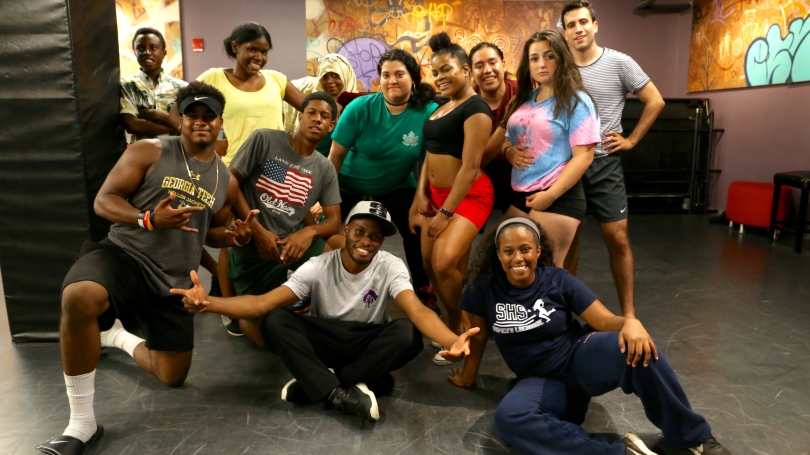
- Public Policy
- Leadership
- Funding
- News & Events
- About the Center
Back to Top Nav
Back to Top Nav
Back to Top Nav
Back to Top Nav
When we hatched the idea of bringing Ugandan dance troupe Tabu Flo to Dartmouth to debut a dance-theater piece weaving themes of power, representation, and voice, we did not anticipate how much their presence would impact our campus. Their twelve days here were marked by testimony after testimony—from students, faculty, community members, and many others—about their ability to inspire critical reflection on our world through the art of dance. This was encapsulated in their performance of “The Speech”, which painted an evocative picture of state-run systems that afford some people the ability to speak and withhold that opportunity from others. In the piece, Tabu Flo combined passionate expression with nuanced symbolism, using costume and choreography (without uttering a word) to highlight how different institutional actors participate in this exercise of power.
Leading up to this culminating performance, Tabu Flo visited three classes in the History and African and African American Studies departments and led students in lively discussions about modern African culture and the activism they engage in as a group. They also led workshops with student dance groups, religious groups, and SEAD (Summer Enrichment at Dartmouth) high school students and their Dartmouth student mentors, as well as performing and leading discussions with two House Communities. From these events we saw groups of students from varied backgrounds coming together in collaboration, and audiences and workshop participants left Tabu Flo’s events with challenged assumptions about people who seem different, foreign, or “other” and a deepened understanding of the African continent. All told, Tabu Flo impacted over 430 students, staff, and community members through their performances and workshops.
This experience convicted us of the unique power and long reach of the arts. The world of policy and regulation remains impoverished and dangerously vulnerable to its own blind spots when it does not engage the arts in dialogue. Artistic expression reveals valuable insights about the impact of policy because it probes dimensions of the human experience that other forms of inquiry are not equipped to see with the same clarity. We watched these insights emerge in the rich discussion that the audience had with Tabu Flo after the performance concluded. In characteristic form, Tabu Flo reversed the traditional formula of audience talk-back by asking the crowd what they thought the show meant. What followed was a diverse tapestry of connections, emotions, and realizations; moreover, this was likely just a taste of the collective meaning the 130-member audience had interpreted from the piece. The arts provide an unparalleled window into the consequences of human decisions—our own, and those of the people we put in power. Tabu Flo’s show served as an invaluable reminder of that fact.
Additionally, we learned tremendously while navigating the operational complexities of putting Tabu Flo’s residency at Dartmouth together. The scope of collective action is powerful, which we realized as we collaborated with several partners, both on-campus and off, to design, finance, and implement the residency’s programmatic core. As our goals came into sharper focus, we learned to set priorities with a spirit that balanced adaptability and resilience, deepening our capacity to discern which was required in each situation we encountered. We are grateful for the opportunity we received to bring this project to fruition, and we hope that this is just the beginning of Tabu Flo’s relationship with Dartmouth.
-Submitted by Gretchen Herrick '17 and Jake Casale '17, Rockefeller Center Mini Grant Recipients
The Rockefeller Center's Mini-Grants program funds registration fees for students attending conferences, as well as the costs of bringing guest speakers to Dartmouth. The views and opinions expressed here are the author’s own and do not necessarily represent the views and opinions of the Rockefeller Center or constitute an endorsement by the Center.